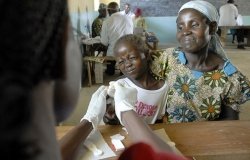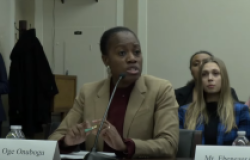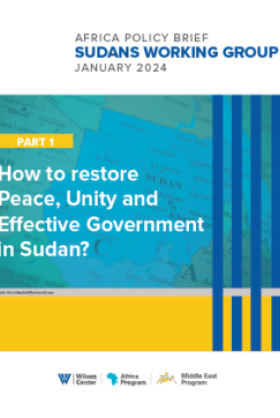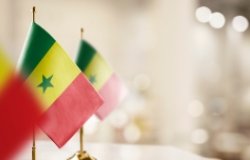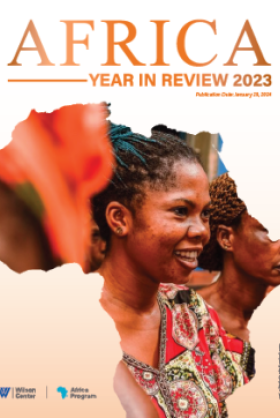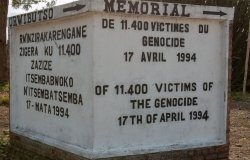The Democratic Republic of Congo on the Eve of Elections
With Howard Wolpe, Director of the Africa Program and Leadership Project, Chris Hennemeyer Director of Africa and Middle East Programs, IFES and Wilson Center Senior Scholar Herbert Weiss. Kinshasa-based NGOs will provide updates on recent developments via teleconference.
Overview
Howard Wolpe, Africa Program and Leadership Project Director, Wilson Center
Chris Hennemeyer, Africa and Middle East Programs Director, IFES
Herbert Weiss, Senior Scholar, Wilson Center
and via teleconference:
Carmina Sanchis-Ruescas, DRC Chief-of-Party, IFES
Herbert Brown, DRC Resident Director, National Democratic Institute
Caty Clement, Central Africa Project Director, International Crisis Group
Michel Kassa, Country Coordinator, ILCCE
On Friday July 28th, the Woodrow Wilson International Center for Scholars' (WWICS) Africa Program, along with International Foundation for Election System (IFES) co-sponsored an assessment of the upcoming elections in the DRC. Africa specialists Howard Wolpe, director of the Wilson Center's Africa and Leadership Programs, Christian Hennemeyer, director of the Africa and MENA programs at IFES, and Herb Weiss, Wilson Center senior scholar, were joined via telephone by a distinguished group of experts on the ground in Kinshasa. Speaking from Kinshasa were Herbert Brown, DRC Country Director at the National Democratic Institute (NDI), Caty Clément, Central Africa Program Director at the International Crisis Group (ICG), Carmina Sanchis-Ruescas, IFES Chief of Party for the DRC, as well as Michel Kassa, Country Coordinator for the Initiative Pour un Leadership Collaboratif et la Cohésion de l'Etat en RDC.
Christian Hennemeyer began the discussion with an historical perspective on this weekend's elections. He argued that, despite elections immediately after independence and several sham elections under Mobutu, this would be the first real national election that the DRC has ever seen. While observers expect the election to be relatively free and fair, Hennemeyer laid out several challenges to ensuring a transparent and equitable process, including technical and logistical problems, the opacity of the highly complicated ballot to a largely illiterate population, and security challenges in Kinshasa and the Eastern provinces. He argued that these elections are among the most important in African history due to the size and complexity of the DRC, and the significance of developments in the DRC for the stability of the entire region. He lamented the United States.'s relatively limited involvement and stressed that elections are merely a beginning, not an end, when it comes to the DRC's recovery from war.
Carmina Sanchis-Ruescas spoke next about the international community's involvement in election preparations. Despite the presence of 30,000 domestic civil society observers, 15,000 observers from political parties, and 1,300 international elections observers, many of the nation's 50,000 polling stations will go unmonitored due to lack of funding and transportation, and a shortage of observers. In particular, she maintained that the financial and logistical inability of political parties to monitor the election process outside of their regional strongholds limits their capacity to ensure fair play.
Herb Brown continued the discussion with an analysis of the major political parties that are likely to play an important role in the elections. He argued that with the announced UDPS boycott of the elections, uncertainty over how UDPS partisans will vote precludes the possibility of confidently anticipating the outcome. Even so, he offered a prediction that the top five vote-getters will be sitting president Joseph Kabila, Jean-Pierre Bemba (MLC), Oscar Kashala (UREC), Pierre Pay Pay (CODECO), and Azarias Ruberwa (RCD). While observers have long expected a Kabila victory, Brown argued that the consolidation of opposition forces in the recent weeks against the incumbent makes a Kabila victory in the first round increasingly unlikely, and increases the possibility of a unified opposition in the second round of elections.
Caty Clement began her remarks by identifying three factors that threaten to undermine the legitimacy of the results: privileged access of incumbents to campaign financing; use of privately owned media outlets in violation of agreed campaign regulations; and the threat that armed groups might seek to reverse the election results, as the security services have not yet been successfully integrated. She then addressed the nature of the new country's new constitutional framework, noting that the balance of power would be heavily weighted towards the president vis-à-vis the parliament.
Michel Kassa praised the transitional government for its ability to secure promises from many non-integrated armed groups not to upset the electoral process. These groups included Peter Karim's MRC and others in Ituri, renegade General Laurent Nkunda in the Kivu provinces and Mai-Mai militia leader Gedeon in Katanga. Assuring the population that these leaders will not interfere with the vote is a very positive step for people in the East.
Herb Weiss followed by describing what he termed as a "souring of the mood" of Congolese towards the Congolese electoral process. He attributed this in part to the perception of Congolese voters that the West has already crowned Kabila as the next president of the DRC. In the eyes of the Congolese, the West is attempting to escort its favorite candidate to power, thus robbing the people of their right to self-determination. According to Weiss, Western nations deemed Kabila's role as interim president "non-negotiable" during the power-sharing negotiations that ultimately lead to the transitional government, and has given him a significant incumbent advantage. The reality of past Western manipulation provides historical justification for the Congolese perception of Western involvement in the DRC as fundamentally being pro-Kabila in nature.
Weiss also analyzed the political strategy employed by the UDPS throughout the campaign. Having initially boycotted the election, he believed that many UDPS supporters who nonetheless registered to vote, would now support Bemba in large numbers. He also argued that the position of leaders within the Catholic Church and of others opposed to the election process followed a similar trajectory. Upon realizing that each abstention would effectively translate into a vote for Kabila, they, like UDPS partisans, had reversed their "election boycott" position to encourage the largest turn-out possible, believing this would be the more effective means of stopping Kabila, by generally turning them towards another candidate.
In conclusion, Weiss stated that the West's perceived investment in Kabila as a candidate has not only undermined Western credibility among the Congolese, but has also increased the likelihood that the election will be forced to a second round. Weiss expressed concern that if this occurs, the president might use the period between the elections to consolidate power at a time when no other permanent institutions are in place, and might even attempt to postpone the later election.
During the question and answer session, Hennemeyer answered a question about the role of African institutions in the DRC election preparations. He explained that African involvement has been somewhat limited, with the exception of South Africa and Angola, due to the involvement of many neighboring nations in the country's internal politics. The Kinshasa-based panelists remarked that South Africa has made significant contributions, but that it has not been immune from the Congolese skepticism felt towards much of the international community's intervention. Although the African Union does not have a large presence in the DRC, many African nations have provided assistance under the auspices of the Southern African Development Community (SADC) and La Francophonie.
When asked about the extent of debate surrounding the bi-polar constitution, with both a president and prime minister wielding significant power, Clement replied that the details of the constitution have been largely overlooked in the political discourse due to the pressing desire of the Congolese to rapidly install democracy, regardless of its form. Also, because of an excess of confidence among the parliamentarians approving the constitution that his/her own party would prevail in the presidential race – there was a lack of safeguards built into the constitution for opposition parties who would likely be represented within the parliament. It was noted, in addition, that many of those who oppose the new constitution do so out of aversion to what they see as a Western importation.
Weiss responded to a question on post-election security concerns with a critical evaluation of the Disarmament Demobilization and Reintegration (DDR) initiatives in the DRC. With regard to demobilization, he argued that "paying people to disarm will be a disaster." He criticized the architects of the Congolese DDR programs for providing financial incentives to demobilized soldiers without a mechanism to ensure their incorporation into the society and economy. A better strategy, he argued, would be to keep ex-combatants in their military units until provide new integrative structures were in place to provide job-creating opportunities, through road-building and similar public works projects.
Marcus Baker and Katherine Hasty, Interns, Africa Program
Howard Wolpe, Director
Documents & Downloads
Hosted By

Africa Program
The Africa Program works to address the most critical issues facing Africa and US-Africa relations, build mutually beneficial US-Africa relations, and enhance knowledge and understanding about Africa in the United States. The Program achieves its mission through in-depth research and analyses, public discussion, working groups, and briefings that bring together policymakers, practitioners, and subject matter experts to analyze and offer practical options for tackling key challenges in Africa and in US-Africa relations. Read more
Thank you for your interest in this event. Please send any feedback or questions to our Events staff.




